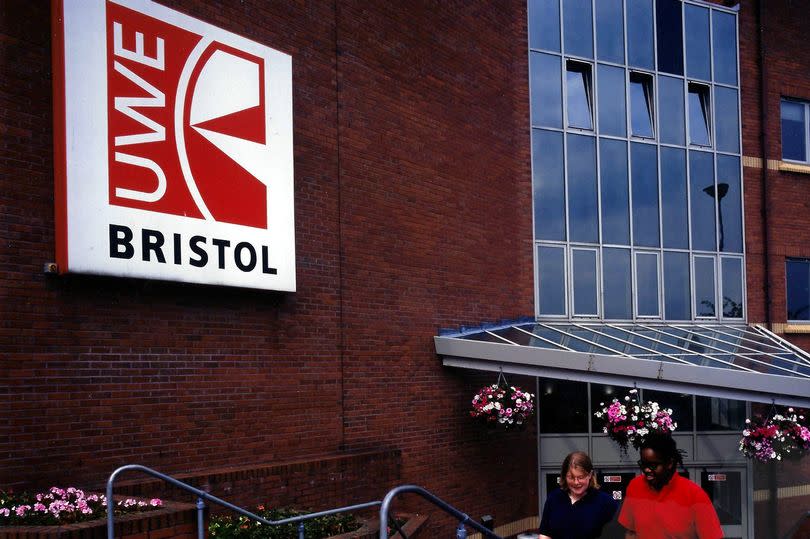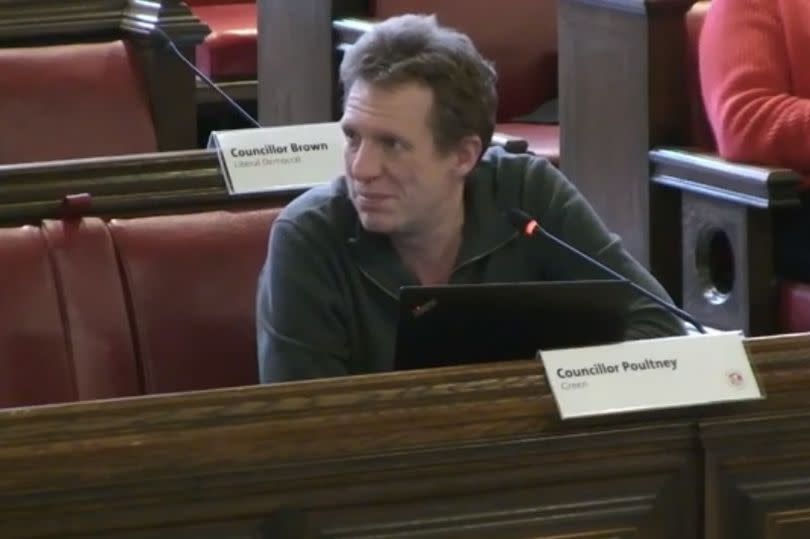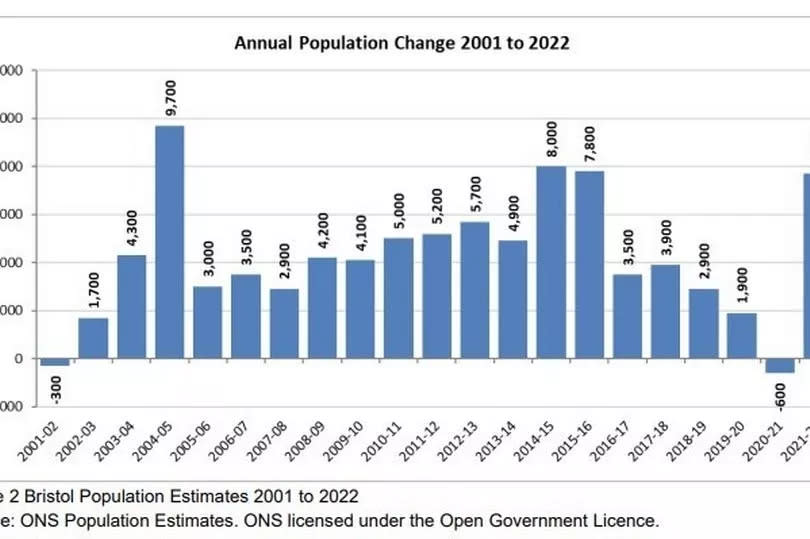Green councillor says 'universities are the housing crisis' in Bristol as student numbers shoot up

A prominent Green councillor has blamed Bristol’s housing crisis on the rapid expansion of the city’s two universities. The number of students enrolled in Bristol has shot up by over 42 per cent since 2015, adding to demand for homes and driving up rents.
However the University of Bristol and the University of the West of England have hit back and say they contribute many millions to the local economy, provide jobs and make the city “one of the most exciting places to live” in the country. Either way, there is now a growing shortage of homes.
Bristol’s population increased by over 10 per cent over the last decade, according to census data, rising from 428,200 in 2011 to 472,400 in 2021. This is higher than the overall increase in England of 6.6 per cent, and general migration to the city far outstrips the rise in students.
Read more: More than 20,000 extra student beds needed to cope with Bristol's expanding universities
Read more: Plans approved for hundreds of new student flats up to 10-storeys tall
But both the universities in Bristol saw their enrolment figures jump by 10,000 each in the space of seven years, meaning there are now 20,000 extra students living and studying in the city — who are all adding to demand for housing. While many new developments of student flats are under construction or planned, developers are struggling to keep up with the growing demand.
Green Councillor Guy Poultney represents Cotham, where a lot of Bristol University’s campus is located. He also sits as a substitute on the development control A committee, and was the only member to vote against new student flats in Bedminster on Wednesday, June 5. Speaking after the committee meeting, he called on the universities to slow down their expansions.
He said: “The rate of the expansions of both universities massively outpaces the rate at which the [local] authority can reasonably be expected to build new accommodation. The universities are the housing crisis in Bristol and that needs to be borne in mind.”
The number of students enrolled at the city’s two universities has increased from 48,225 in 2014/15 to 68,655 in 2021/22, according to the latest data from the Higher Education Statistics Agency. Bristol Uni’s enrolment figures jumped from 21,555 to 31,485 across the same period, while UWE’s increased from 26,670 to 37,170.
A key success championed by former Labour mayor Marvin Rees was his “One City” forums, where leaders from the public sector and business gathered regularly to discuss solutions to Bristol’s problems. But these weren’t open for the public or press to attend, so it’s unclear how much discussion took place about the expansion of the universities and the effect on the city.
Cllr Poultney said: “If One City had any role at all, it was to plan stuff like this. It was to make sure that expansion was manageable. But the amount of money in tuition fees is breathtaking, when you tot it all up. The bigger challenge for me, in terms of social harm, is the rent.
“If you expand by that much, and it’s all in the private rented sector, any family looking to rent a three-bed property is competing with four or five students, or more depending on how mean the landlord is. If you’ve got five students who are willing to pay £800 a month, there is no way that anyone looking at a similar house is going to afford it.
“So what you do is you just crowd in bad actors — bad landlords, predatory landlords, bad letting agents come in and take over. And that’s exactly what we’ve seen. God, I could show you some houses, Jesus.”

A decade ago in 2014, the average rent in Bristol for a new tenancy was £767. This April, the average rent was £1,756 according to the Office for National Statistics. Rents are currently increasing year-on-year by about 7.7 per cent, while private rental price inflation peaked in Bristol in October 2022 at a staggering 11 per cent.
There are rules in Bristol for landlords converting family homes into houses of multiple occupation (HMOs), and the council does sometimes enforce these. But Cllr Poultney said these rules could be tightened up further.
The problem isn’t confined to Bristol, with other nearby cities such as Exeter and Cardiff also seeing both an influx of students and rising property prices. Other factors play a part too, such as prices rising more quickly than average wages, and an exodus of Londoners fleeing even more expensive rents. Nevertheless the impacts on local communities in Bristol are undeniable.
“I’ve got streets in Cotham that are 50 per cent students,” Cllr Poultney said, “when the threshold is supposed to be 10 per cent. It’s completely unmanageable. We’ve lost our bus service, because the university provides a free bus service. All of a sudden there aren’t enough non-students to create sufficient demand for a viable bus service. It’s the same with the sports centre and all sorts of shops.
“If you live in the middle of Cotham, you can either walk down a massive hill to Gloucester Road to get a bus, or you can walk up to Whiteladies Road. Either way if you’ve got mobility issues or a buggy, it can’t be done or it’s a horrible experience.”

Thousands of student beds are either under construction or planned in Bristol, to meet some of the rising demand. This includes replacing the Premier Inn hotel on the Bearpit with a 28-storey tower block, and building thousands of beds along Malago Road in Bedminster. But whether developers can keep up with the pace of how quickly the universities are expanding is in doubt.
Cllr Poultney said: “I’ve read the new Local Plan as much as I can. It seems to focus on building new PBSA [purpose-built student accommodation] to deal with the problem. Nobody is going to build 40,000 units of PBSA. Don’t get me wrong, if the university wants to build a 200-storey thing on Temple Island, one hideous needle, that could fix the problem.
“But I feel terrible for the students. They’re paying £9,000 or more and God knows how much in rent to get to the city, and then they get here and find that they’re in appalling accommodation, crammed into a neighbourhood that is suffering a lot as a direct result. It’s miserable. At the end of the day, the problem is the expansion. That’s the biggest problem. The universities need to stop expanding faster than the city can provide the accommodation it needs.
“I give massive credit to the new vice-chancellor at Bristol Uni. She [Evelyn Welch] seems very aware of this problem and she’s been hugely supportive to us so far, in terms of helping out with overcrowding of HMOs, helping with anti-social behaviour, and stuff like helping students move out and providing an enhanced bin service. But we’re dealing with symptoms of a problem that’s bad and getting worse.”
One problem facing the university sector across the country is that tuition fees for UK students have been capped for several years, while operating costs have increased with inflation. This leaves two options: expand the number of students, particularly those from abroad who can be charged more than the cap, or cut spending and staff numbers. As well as in Bristol, many universities elsewhere have chosen to expand, partly to raise extra revenue via tuition fees.
Both the universities provide thousands of jobs and their students contribute hundreds of millions to the local economy. Many students also volunteer their services, for example dental students at the University of Bristol delivered 60,000 appointments in the last academic year, and the new Dental School near Temple Meads has doubled the availability of emergency appointments in the local area. A student Law Clinic also offers free legal advice to the public.
A spokesperson for UWE Bristol said: “We’re building ultra low energy student accommodation at our Frenchay campus to respond to the demand for more on-campus accommodation from students who want to study in Bristol. These students contribute millions of pounds to the local economy every year and make Bristol one of the UK’s most exciting cities to live in.
“There is a significant under-supply of housing right across the UK in all sectors, this isn’t a problem limited to the student accommodation market.”

A spokesperson for the University of Bristol added: “Bristol is a fantastic city that is attracting increasing numbers of people — students and non-students alike. Our students have always been part of Bristol’s rich culture. They work and volunteer, and many stay in Bristol after they graduate, starting businesses and families.
“We also know that our students contribute more than £300 million to the local economy each year and that the University of Bristol, its students and their visitors support 13,200 jobs across the city. The university helps fill local and national skills gaps by training doctors, scientists, teachers, engineers, economists, dentists, social workers, entrepreneurs, and more.
“We are conscious of the importance of a sustainable relationship between the city and its universities, which is why we have been working closely with Bristol City Council to implement a plan of new purpose-built student housing. This will increase supply in parts of the city where student housing investment is beneficial to the local community and relieve pressure on other parts of the housing market.”

 Yahoo News
Yahoo News 
